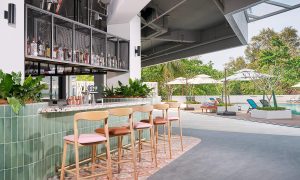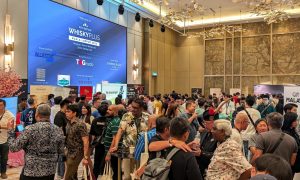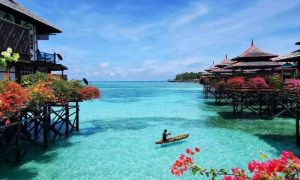THE EXPAT RECENTLY SPOKE WITH HELEN OLDS, THE DIRECTOR OF LEARNING AND HEAD OF SECONDARY AT THE INTERNATIONAL SCHOOL @ PARK CITY AND DISCUSSED HER EDUCATIONAL VISIONS AND BELIEFS AND HOW SHE IS IMPLEMENTING THEM.
THE EXPAT: Can you tell our readers the scope of a Director of Learning’s job specific to ISP?
HELEN OLDS: Being involved in the development of a brand new school has been a very exciting and rewarding experience. My role has been extremely varied and diverse, including: helping to set up a curriculum full of exciting, relevant and interesting learning opportunities; supporting students as they settle into the challenges of a new school and making new friends; facilitating the use of innovative and new technologies to support learning; working with colleagues to provide learning opportunities beyond the walls of the traditional classroom, such as residential and day trips, as well as curriculum enhancement days where students may focus on a single cross-curricular project for a day. My role also involves ensuring that we know student’s strengths and areas for development and making sure that parents and students are given regular feedback about progress.
TE: You are also Head of Secondary. Can you discuss what this involves?
HO: As Head of Secondary, I have been responsible for development of the curriculum and the pastoral care of students with the secondary school. Students move from a more thematic-based curriculum in the primary school with one main teacher to a larger number of specialist teachers in the secondary school. As students move into the secondary school, we build upon the primary curriculum, providing a greater number of leadership opportunities for students, as well as supporting them to become more independent with their learning. In Years 7, 8, and 9 we provide students with the foundation and skills needed to begin the IGCSE programme in Years 10 and 11. Our students tell me that the range of learning activities, use of real-life scenarios, practical ‘hands on’ activities, the emphasis on ‘thinking,’ opportunities to apply knowledge in different contexts, and support from their teachers, all help them to learn.
TE: How are Primary & Secondary integrated, if at all? What are the benefits to the children of integration, even if just of facilities?
HO: Our students really value the opportunity to work with children of different ages. During the ISP book week in Term 1, older students spent time reading with the younger children and during Term 2, the Year 8 class organized a team-building day for Years 5, 6, and 7. The student council also comprises children from the Primary and Secondary schools. Working together, students have suggested a number of ideas such as developing the range of play equipment and activities to help improve the quality of their experience at ISP. All these things provide invaluable leadership opportunities and learning experiences for everyone involved.
TE: Can you tell us about your former postings and what country you are from?
HO: I am originally from the United Kingdom, which is where I trained as teacher and worked in a Secondary school for seven years. Prior to that I worked as an outdoor and environmental education specialist in the United States. Since leaving the UK, I have worked at an international school in Brunei and, most recently, as Deputy Head at the British International School in Jakarta. I have held a range of leadership positions in the schools where I have worked and taught a number of different subjects, including Geography, English, History, and Drama, as well as teaching in A-Level schools and an International Baccalaureate school. As you can see, Ibring a diverse range of experience to ISP!
TE: How do the students here at ISP compare with students in other countries and international schools where you have been? What do you think sets ISP apart from the other international schools? Is it unique in some critical way?
HO: Every school, country, and community is unique. As educators, it is important that we understand this and apply our wealth of experience to shape a learning experience relevant to the community in which we are based, whilst ensuring students are equipped with the skills needed for life in an ever-shrinking world! We have 23 different nationalities represented in the ISP student population. Our students at ISP show a great enjoyment of learning, are committed to their studies and have involved themselves in every aspect of school life, including the wide range of extra-curricular activities we offer.
TE: What are your goals as the Director of Learning for the next new year term?
HO: We have 18 new teachers joining the ISP team and a large growth in our student numbers for the next academic year. Developing the curriculum as we expand into Year 9, increasing the range of opportunities provided by the school and ensuring that we maintain the high standards we established this year are all key goals for us as we move into a new school term.
TE: Andrew Dalton is a very well-known educator who is now ISP’s Principal. I’ve been told by other faculty and senior administrators that he was the primary reason they joined ISP. Do you think his theories and philosophies are part of a growing trend?
HO: I believe that an essential ingredient of a successful school is a shared vision and philosophy. It was Andrew’s vision that encouraged me to join ISP originally, and I have thoroughly enjoyed working with him to put that into practice. Our vision to be ‘Malaysia’s premier school’, along with how we aim to achieve this, is clearly communicated by the leadership and teaching teams. Our parents and students also understand and support us with this. Our shared community vision has been at the heart of our success this year.
This article was written by The Expat for The Expat magazine.
Source: The Expat September 2012
Read more: Sri Garden: International Education in a Malaysian Context


















